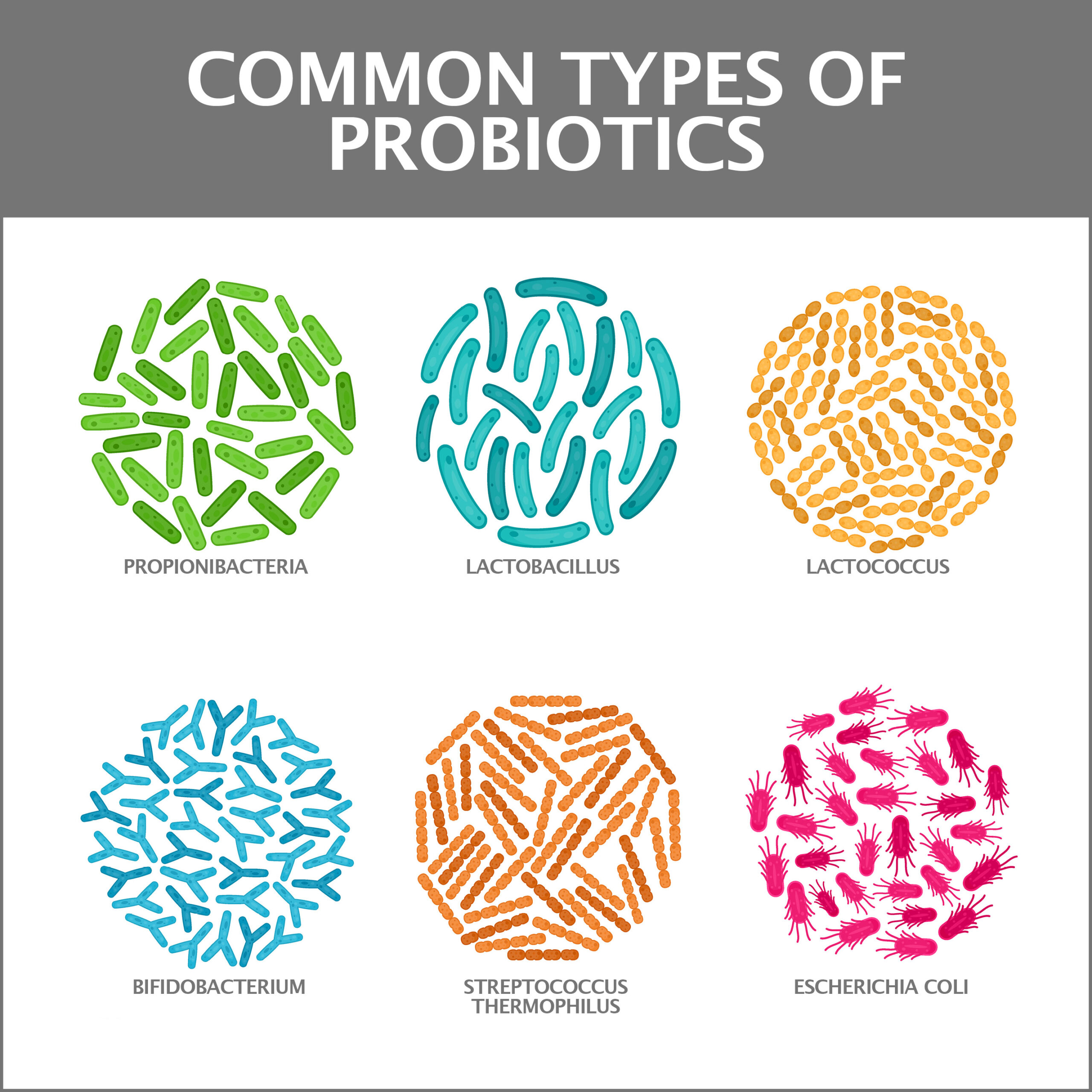
Probiotics: Help or Hype?
The health of your digestive tract is paramount to maintaining optimal well-being and longevity. An unhealthy gastrointestinal system often adversely impacts other parts of your body, resulting in many common and potentially serious or life-limiting illnesses.
Considering these facts, it is important to place significant emphasis on keeping your digestive tract healthy. This can be accomplished by consuming a healthy diet, limiting or eliminating vices like excessive alcohol intake and tobacco use, reducing stress, and obtaining regular medical checkups.
Improved gastrointestinal health can be achieved by taking probiotics.

The Importance of a Balanced Gut Flora
Your gut contains a measurable degree of flora. Flora, also sometimes referred to as fauna or bacterial life, is the millions of different pathogens in your gastrointestinal tract. These organisms are comprised of both good and potentially harmful lifeforms.
In individuals with healthy and balanced gut flora, the positive and productive organisms outweigh the potentially harmful ones. If this balance erodes, you can stand at greater risk of developing notable concerns, including:
- A weakened immune system – A balanced gut fauna is crucial to a strong immune response. The presence of good bacteria is critical to protecting the digestive tract lining from possible invaders capable of causing illness.
- A strengthened metabolism – Optimal gut flora is necessary for the body’s absorption of essential nutrients and minerals needed to carry out countless life-sustaining functions.
Health Risks Associated with Poor Gut Flora Balance
Your risk of several notable ailments heightens when your gut fauna is off balance, such as:
- Diabetes.
- Inflammatory bowel disease.
- Irritable bowel syndrome.
- Repeated systemic infections.
- Obesity.
- A decreased metabolism.
The problem is also linked to many skin diseases.
Issues Impacting Gut Flora
Several health, environmental, and lifestyle issues can negatively influence optimal gut flora, including:
- Failing to eat a balanced and nutritious diet.
- Excessive alcohol consumption.
- Not obtaining adequate exercise.
- Tobacco usage.
- A lack of sleep.
- Excessive stress.
- Ailments like infections.
Medications are especially capable of throwing off this important equilibrium. This is particularly true of antibiotics. These drugs play the important role of eradicating harmful bacteria. In the process, they can also eliminate the beneficial ones.
Probiotics Overview
Probiotics are collections of bacteria naturally occurring inside your digestive system. Your physician may encourage you to take probiotic supplements when your gut fauna balance is bad or to augment optimal digestive health.
The Method by Which Probiotics Work
When you consume probiotics, they are released into your gastrointestinal system and take their place inside your gut flora.
Common Types of Probiotics
There are many probiotics. Good pathogens commonly used to create probiotic supplements include bifidobacterium, lactobacillus, and saccharomyces boulardii.

Potential Benefits
Besides aiding your immunity and metabolism, probiotics may also yield health benefits such as:
- Preventing or lessening the occurrence of digestive issues like bloating and gas.
- Reducing the chances of bladder cancer recurrences.
- Lowering the risk of both urinary tract and vaginal infections.
- Skin disorders like eczema.
More extensive research has shown that probiotic ingestion is also relatively effective in decreasing incidents of common concerns like diarrhea and constipation.
Administering supplements containing lactobacillus reduces cases of infectious diarrhea in young people. Two major studies have demonstrated how probiotics have reduced or lessened the severity of diarrhea related to antibiotics usage.
Probiotics can increase bowel movements in individuals with constipation and softens stools making them easier to discard.
Methods Of Ingesting Probiotics
Probiotics may be ingested in several different ways.
One common administration form is via dietary supplements. These are often available in pill form and may contain hundreds of different specific organisms. These products are available at pharmacies, supermarkets, or vitamin store chains.
Probiotic pathogens are also often found in certain foods and drinks (also known as prebiotics), including:
- Sauerkraut.
- Kefir.
- Kimchi.
- Tempeh.
- Kombucha.
- Miso.
- Buttermilk.
- Pickles.
- Cheeses such as gouda, cheddar, cottage, and mozzarella.
- Natto.
- Cereals.
- Juice products.

Yogurt is the most probiotic-laden food available. This popular dairy offering is milk fermented with certain notable probiotics.
Not all yogurt contains probiotics. Sometimes organisms are eradicated during the pasteurization process, so it’s important to carefully read labels and only opt for products containing probiotics when purchasing yogurt.
Safe Use of Probiotics
In most cases, probiotics are safe when used as directed or under a physician’s supervision.
The products should not be used indiscriminately. Every substance carries risks when not used appropriately. You are strongly encouraged to undergo a full physical examination before beginning any probiotic regimen. Your doctor will identify the best products and set a safe but most effective dosage if used to address a specific health condition.
Possible Contraindications
As previously stated, most probiotics are safe for most people. You might face contraindication (a reason not to take a specific medical treatment due to the harm that it could cause) if you have a weakened immune system or significant metabolic disorders. In these instances, probiotics may heighten your risk of developing infections and potentially serious issues like antibiotic resistance.
Possible Side Effects
Introducing any new substance or medication into your body can precipitate side effects. This is because your body requires time to adjust to it. Researchers have discovered that the most common probiotic-related side effects include mild diarrhea, gas, and headaches. Some people also experience brief bouts of constipation.
Are Probiotics Suitable for Children?
Doctors believe that probiotics are suitable for children.
In fact, the organisms might yield additional benefits in young persons. Researchers have concluded that probiotics may enhance a child’s cognitive functions like memory and focus, brain development, and mood.
The substances do not seem to pose any notable risks for children unless they are stricken with an immune system or metabolic disorder.
You should not administer probiotics to infants under one year of age unless strictly supervised by a pediatrician. This is because their digestive tracts are not yet developed, and researchers are unclear about the impact such organisms might have under those circumstances.
Should Probiotics Be Taken After Taking Antibiotics?
Your doctor might recommend using probiotics following a course of antibiotic treatment, but it is not always a requirement. They will consider other factors before prescribing this therapeutic protocol, such as your general health, the severity of your gut flora imbalance, and your dietary habits.
Final Thoughts
Probiotics can reduce the risk of certain diseases, lessen the severity of such ailments when they occur, or reduce the incidents of associated physical symptoms.
Probiotic organisms are not a fail-safe remedy for any specific health condition.
Contact Us
Our practice began more than 15 years ago and has emerged as one of the leading gastroenterology practices in central Florida. We perform various diagnostic procedures using state-of-the-art equipment in a friendly, comfortable, and inviting atmosphere where patient care is always a top priority. Contact us today!